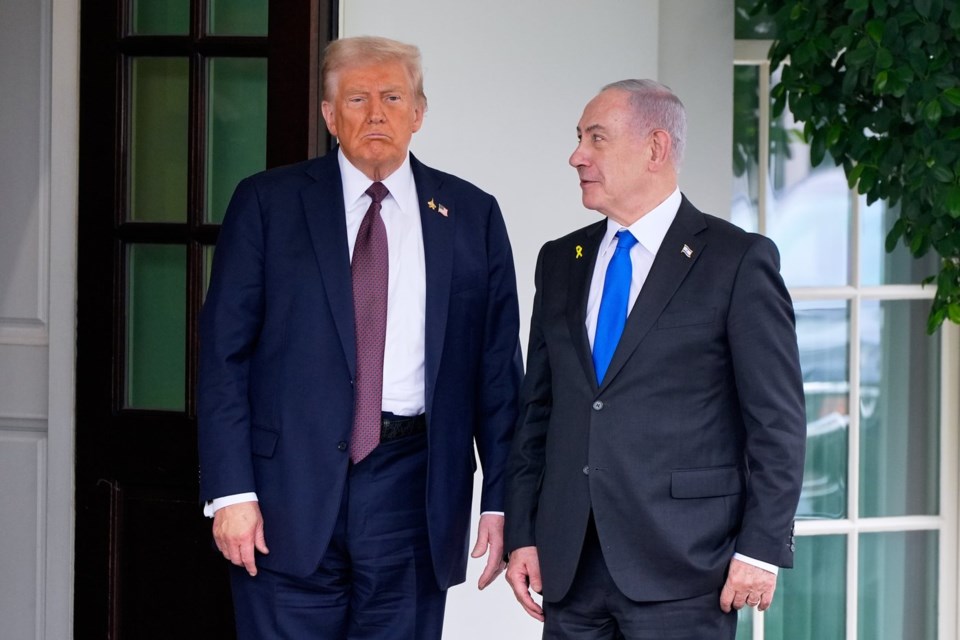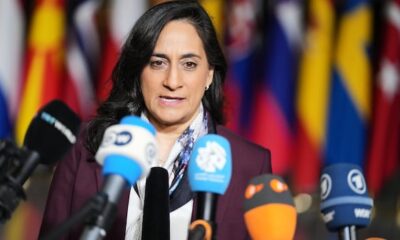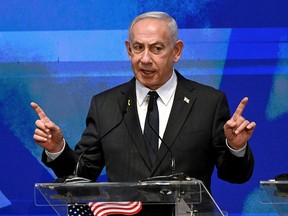Politics
Netanyahu Apologizes to Qatar After Controversial Military Strike

Israeli Prime Minister Benjamin Netanyahu formally apologized to Qatar during a White House visit on September 9, 2023, for a military strike that targeted Hamas officials in Doha. This incident has drawn significant criticism from Arab leaders and marked a rare moment of disapproval from the United States towards Israel. The apology came as Netanyahu met with President Donald Trump for discussions centered on ending the ongoing conflict in Gaza and formulating a U.S. strategy for governance in the war-torn territory.
The White House stated that Netanyahu expressed “deep regret” for the missile strike that unintentionally resulted in the death of a Qatari serviceman. The Israeli Prime Minister acknowledged that the operation violated Qatari sovereignty as it aimed to strike Hamas leadership during sensitive hostage negotiations. The statement reaffirmed Israel’s commitment to avoid such actions in the future.
This diplomatic gesture occurs at a precarious time for Israel, as it faces growing isolation from long-time allies. Netanyahu’s coalition government appears increasingly fragile, and the Biden administration is showing signs of impatience with Israel’s military strategy. The question now looms over whether Trump, who has consistently supported Netanyahu, might alter his approach in response to the recent tensions.
During the meeting, Trump conveyed optimism regarding a potential resolution to the conflict, affirming, “I am very confident” that a deal would soon be reached to cease hostilities between Israel and Hamas.
The strike on September 9, which targeted Hamas’ political leadership in Qatar, raised international eyebrows, particularly as it took place in a Gulf nation that hosts thousands of American troops and has acted as a mediator in the conflict. While no senior Hamas officials were killed, the attack was perceived as a significant escalation that threatened to derail ongoing negotiations for a ceasefire and the release of hostages.
Qatar condemned the airstrike, labeling it a “flagrant violation of all international laws and norms.” Other Gulf allies, including Saudi Arabia and the United Arab Emirates, expressed their support for Qatar in the wake of the incident.
In response to the escalating conflict, White House Press Secretary Karoline Leavitt urged both Israel and Hamas to finalize an agreement to end the nearly two-year-old war in Gaza. She emphasized the necessity for resolution, stating, “Ultimately the president knows when you get to a good deal, both sides are going to leave a little bit unhappy. But we need this conflict to end.”
The discussions between Trump and Netanyahu were preceded by a private meeting with aides, followed by a joint press conference. Meanwhile, Riyad Mansour, the Palestinian ambassador to the United Nations, indicated that Palestinian officials are prepared to collaborate with Trump and Arab nations to bring the conflict to a close.
The relationship between Trump and Netanyahu has recently grown more strained. Trump expressed frustration over a failed strike on Hamas officials, while also opposing any potential Israeli annexation of the West Bank, a plan supported by some of Netanyahu’s more hardline coalition partners. The international community has largely condemned such annexation efforts, viewing them as detrimental to future peace prospects.
Trump has proposed a plan to cease hostilities in Gaza that includes an immediate ceasefire, the release of hostages within 48 hours, and a gradual withdrawal of Israeli forces from the area. Details of the proposal, which has not yet been formally released, indicate that Hamas is believed to be holding approximately 48 hostages, with around 20 thought to be alive.
This plan does not call for the expulsion of Palestinians from Gaza, a notion that Trump appeared to endorse earlier in the year. Instead, it includes provisions for the disarmament of Hamas and the establishment of an international security force to oversee law enforcement in the region post-conflict. A committee of Palestinian technocrats would manage civilian affairs until authority can be transitioned to a reformed Palestinian Authority, which Netanyahu has previously rejected as a governing body in Gaza.
Despite Hamas being briefed on the proposal, it has yet to receive an official offer from mediators from Egypt and Qatar. The militant group has continued to link its armament to the establishment of an independent Palestinian state, indicating ongoing complexities in reaching a resolution.
In this intricate landscape of international diplomacy, Netanyahu’s recent apology underscores the delicate balance of regional relations and the urgent need for a sustainable peace agreement.
-

 Politics4 weeks ago
Politics4 weeks agoSecwepemc First Nation Seeks Aboriginal Title Over Kamloops Area
-

 World5 months ago
World5 months agoScientists Unearth Ancient Antarctic Ice to Unlock Climate Secrets
-

 Entertainment5 months ago
Entertainment5 months agoTrump and McCormick to Announce $70 Billion Energy Investments
-

 Science5 months ago
Science5 months agoFour Astronauts Return to Earth After International Space Station Mission
-

 Lifestyle5 months ago
Lifestyle5 months agoTransLink Launches Food Truck Program to Boost Revenue in Vancouver
-

 Technology3 months ago
Technology3 months agoApple Notes Enhances Functionality with Markdown Support in macOS 26
-

 Lifestyle3 months ago
Lifestyle3 months agoManitoba’s Burger Champion Shines Again Amid Dining Innovations
-

 Top Stories2 months ago
Top Stories2 months agoUrgent Update: Fatal Crash on Highway 99 Claims Life of Pitt Meadows Man
-

 Politics4 months ago
Politics4 months agoUkrainian Tennis Star Elina Svitolina Faces Death Threats Online
-

 Sports5 months ago
Sports5 months agoSearch Underway for Missing Hunter Amid Hokkaido Bear Emergency
-

 Politics5 months ago
Politics5 months agoCarney Engages First Nations Leaders at Development Law Summit
-

 Technology5 months ago
Technology5 months agoFrosthaven Launches Early Access on July 31, 2025





















